PDF chapter test TRY NOW
The lesson "I Want Something in a Cage" is written by L E Greeve. The lesson is about a pet shop owner named Mr Purcell, and he is the protagonist of the lesson.
The lesson opens with the narrator stating that Mr Purcell never believed in the existence of ghosts. On a fine day, a man came to Mr Purcell's pet shop and purchased two doves. After obtaining the doves, the man performed an unusual act. Mr Purcell was taken aback by the strange act, which led him to believe that something weird was going on around him. When the customer left the shop, there remained a musty smell of an abandoned, haunted house. The statement implies that the smell seemed to be something unpleasantly old coming from an empty ghost house. Furthermore, the man's actions made him feel as if he wasn't a human.
The lesson opens with the narrator stating that Mr Purcell never believed in the existence of ghosts. On a fine day, a man came to Mr Purcell's pet shop and purchased two doves. After obtaining the doves, the man performed an unusual act. Mr Purcell was taken aback by the strange act, which led him to believe that something weird was going on around him. When the customer left the shop, there remained a musty smell of an abandoned, haunted house. The statement implies that the smell seemed to be something unpleasantly old coming from an empty ghost house. Furthermore, the man's actions made him feel as if he wasn't a human.
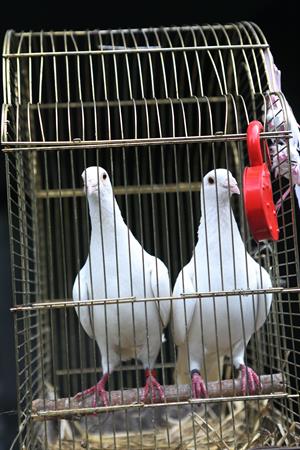
A man purchased two doves from Mr Purcell's pet shop
Later the narrator introduced the character of Mr Purcell by telling the appearance of the man to his readers. Mr Purcell was a short, chubby man. He was a fussy man who couldn't be satisfied easily and had very high standards about things. His cheeks were red, and his stomach was shaped like a melon. It implies that Mr Purcell was fat and short, with a melon-shaped belly. In addition, he wore spectacles. His eyes were magnified by large glasses, giving him the appearance of a wise and genial owl.
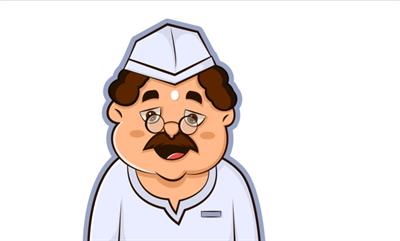
A small man with red cheeks and glasses
Mr Purcell was the owner of a pet shop. There were many birds, cats, dogs, and monkeys in his shop, and he used to sell pet animals to his customers.
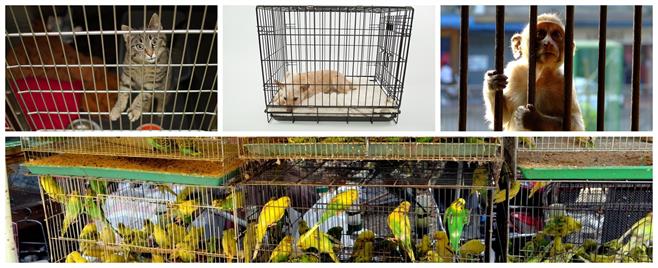
Pet shop
In addition to the pet animals, he also sold bird seeds, fish food and cages. Furthermore, Mr Purcell provided customers with remedies on how to maintain or care for their canaries. Also, he displayed long rows of gilded cages on his shelves, and the cages were intricately shaped or ornamented with complex patterns. Mr Purcell considered himself to be a professional man. It implies he felt proud of running his own business.
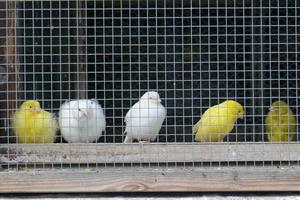
Canaries
The narrator then remarked that Mr Purcell's shop was always bustling with movements. The pet animals and the birds in Mr Purcell's shop constantly roamed here and there inside the cage. The birds made chirpings, cheeps, squeals, and sudden squeaks while moving inside the cage, and the tiny feet's inside the cage ran around in fear. The pets, on the other hand, appeared to be terrified, worried and looking for something. According to the narrator, the caged pets demanded liberation. They wiggle around inside the cage, not in joy but in the hope that someone would let them out. This never-ending spark of life pulsated across the shelves. The statement implies that the pets in Mr Purcell's shop lived their lives with hopes across the shelves. 

On the other hand, the customers who visited the shop while looking at the pets would say that the pets inside the cage were adorable and charming. While reading the story, one can understand the differentiation of views given in the story. The caged birds and animals were afraid, and they desired liberation from their confinement. On the other hand, customers seemed to love the caged birds' funny acts while staring at them. They were unaware of how the pets felt while in the cage, or the hilarious acts did not convince the customers that the pets wished to leave the cage.
When Mr Purcell saw his customers' happiness, he would smile, rub his hands, and emphatically shake his head. The phrase "rub his hands" meant to be in keen or greedy anticipation of something. The statement implies that Mr Purcell would rub his hands because he knew that he'd make money if he sold the pets for a fair price. So whenever he saw his customers, Mr Purcell would rub his hands in excitement.
When Mr Purcell saw his customers' happiness, he would smile, rub his hands, and emphatically shake his head. The phrase "rub his hands" meant to be in keen or greedy anticipation of something. The statement implies that Mr Purcell would rub his hands because he knew that he'd make money if he sold the pets for a fair price. So whenever he saw his customers, Mr Purcell would rub his hands in excitement.
Mr Purcell used to open his shop every morning. Once he opened the shop, his daily routine was to sit on a high stool behind the counter. He sat on a high stool because he was short and wanted to see the customers when they entered the shop. Later he would unfold his morning paper, and digest the day’s news. The term "digest the day's news" implies that he would take necessary time to understand what was given in it, and also, he would read every nook and corner from the newspaper. While he was in the pet shop, he'd have plenty of time to read the newspaper till the customer arrives.
Then the narrator mentioned the different ways and expressions Mr Purcell used to read the newspaper. Usually, a newspaper consists of varying news. So while reading the newspaper, he would show many expressions on his face. As he read the newspaper, he would smirk at times. When he saw some intense arguments or annoying things, he would raise his eyebrows and shown dissatisfaction on his face. Also, he would pursue his lips. The phrase "pursed his lips" refers to the tightening of the lips to make a rounded shape. It was frequently done to show an expression of disapproval. In addition, if he read any serious issue, he would nod his head. These things suggest that Mr Purcell was quite interested in reading the news from the newspaper. He'd react as if things were reported in the newspaper.
Then the narrator mentioned the different ways and expressions Mr Purcell used to read the newspaper. Usually, a newspaper consists of varying news. So while reading the newspaper, he would show many expressions on his face. As he read the newspaper, he would smirk at times. When he saw some intense arguments or annoying things, he would raise his eyebrows and shown dissatisfaction on his face. Also, he would pursue his lips. The phrase "pursed his lips" refers to the tightening of the lips to make a rounded shape. It was frequently done to show an expression of disapproval. In addition, if he read any serious issue, he would nod his head. These things suggest that Mr Purcell was quite interested in reading the news from the newspaper. He'd react as if things were reported in the newspaper.

Mr Purcell reading newspaper
Furthermore, he would read everything, and even he would read the advice given to the lovelorn. The term "lovelorn" referred to a person who felt miserable because someone had stopped loving them. He also used to read the advertisements from the newspaper. People usually read their favourites or most exciting stuff from the newspaper. Some people would skip the newspaper's advertisement section. Mr Purcell, on the other hand, was quite different, and he would read the entire advertisement column. Moreover he would not leave anything in the newspaper unread. It could be because he was curious about things around him, or else he would have plenty of time to read the newspaper.
Furthermore, he would read everything, and even he would read the advice given to the lovelorn. The term "lovelorn" referred to a person who felt miserable because someone had stopped loving them. He also used to read the advertisements from the newspaper. People usually read their favourites or most exciting stuff from the newspaper. Some people would skip the newspaper's advertisement section. Mr Purcell, on the other hand, was quite different, and he would read the entire advertisement column. Moreover he would not leave anything in the newspaper unread. It could be because he was curious about things around him, or else he would have plenty of time to read the newspaper.
After narrating about the daily routine of Mr Purcell, the narrator stated the weather condition of the city. It was a hard day. A strong wind buffeted the lofty, plate-glass windows. The town was engulfed in smoke, and the air was bleak and frosty because it was winter season. After completing his daily task, such as opening the shop, Mr Purcell again mounted on the high stool and took his newspaper. Then he spread out the morning newspaper, adjusted his spectacles, and gave a quick look at the headlines of the day.
While he was reading the newspaper, a lot of noises were vibrating around him. Mr Purcell was surrounded by chirping, squeaking, and mewing, but he didn't hear it any more than he would have listened to the monotonous ticking of a familiar clock. The chirping of birds, the squeaking of rats, and the mewing of cats could all be heard throughout the pet shop, but he was blissfully unaware of it. It implied he was used to those sounds, and he was never bothered by that, and it wouldn't disturb him.
The narrator later added that there was a bell over the door that jingled whenever a customer entered Mr Purcell's shop. So, while he was reading the newspaper, the jingling sounds of the bell would alert him that the customer had arrived.
While he was reading the newspaper, a lot of noises were vibrating around him. Mr Purcell was surrounded by chirping, squeaking, and mewing, but he didn't hear it any more than he would have listened to the monotonous ticking of a familiar clock. The chirping of birds, the squeaking of rats, and the mewing of cats could all be heard throughout the pet shop, but he was blissfully unaware of it. It implied he was used to those sounds, and he was never bothered by that, and it wouldn't disturb him.
The narrator later added that there was a bell over the door that jingled whenever a customer entered Mr Purcell's shop. So, while he was reading the newspaper, the jingling sounds of the bell would alert him that the customer had arrived.

Jingling bell
But on that fine morning, Mr Purcell would recall that the bell failed to ring. It implies that he spotted someone entering his shop for the first time without hearing the bell jingle. When he looked up, he saw a stranger standing inside the door, as if he had materialised out of thin air. The phrase "out of thin air" in this context suggested that someone or something appeared unexpectedly without any intimation. The sentence implies that usually, when a customer opens the door to enter the store, the bell over the door would ring. But that day, when the strange man entered the shop unexpectedly, the door bell did not jingle.
But on that fine morning, Mr Purcell would recall that the bell failed to ring. It implies that he spotted someone entering his shop for the first time without hearing the bell jingle. When he looked up, he saw a stranger standing inside the door, as if he had materialised out of thin air. The phrase "out of thin air" in this context suggested that someone or something appeared unexpectedly without any intimation. The sentence implies that usually, when a customer opens the door to enter the store, the bell over the door would ring. But that day, when the strange man entered the shop unexpectedly, the door bell did not jingle.
When Mr Purcell saw the man inside his pet shop, he slipped off his stool. From the first instant, Mr Purcell knew instinctively and unreasonably that the man hated him. But out of habit, when he saw him, he rubbed his hand, smiled at the man, and nodded his head.
After the unpleasant feeling, Mr Purcell welcomed the man. Because that was his job, and he needed to please his client. So he offered him a pleasant morning and inquired, “What can I do for you?” While Mr Purcell was speaking, the man, without saying anything, stepped forward with his shiny shoes. It signifies that the shoes he wore were new.
After the unpleasant feeling, Mr Purcell welcomed the man. Because that was his job, and he needed to please his client. So he offered him a pleasant morning and inquired, “What can I do for you?” While Mr Purcell was speaking, the man, without saying anything, stepped forward with his shiny shoes. It signifies that the shoes he wore were new.
On the other hand, the man wore a cheap suit that didn’t fit him well, but it was new. It meant that the coat was loose, and it didn't suit him well, despite the fact that it looked new. Also, his hair was closely cropped, and he had a shuttling look. Even though Mr Purcell remained in front of him, the man neglected him for a moment and looked at the shadowy pet shop.
Later, Mr Purcell came forward and voluntarily said, “A nasty morning”. Then he smiled thoughtfully at the man and clasped both hands across his melon-like tummy. Furthermore, Mr Purcell stated that the weather was cold and that had been reported in the newspaper. After telling about the weather, he asked the stranger, “Now what was it you wanted?” He inquired because the strange man had been silent for a long time and was staring only at the pets in his shop.
Later, Mr Purcell came forward and voluntarily said, “A nasty morning”. Then he smiled thoughtfully at the man and clasped both hands across his melon-like tummy. Furthermore, Mr Purcell stated that the weather was cold and that had been reported in the newspaper. After telling about the weather, he asked the stranger, “Now what was it you wanted?” He inquired because the strange man had been silent for a long time and was staring only at the pets in his shop.
After hearing Mr Purcell’s voice, the man looked closely at him. He stared at him because he was aware of the storekeeper's presence at that moment. When he entered the shop, he looked at the pets and was utterly unaware of Mr Purcell's presence.
When the storekeeper realised the customer required "Something in a Cage", he became confused and inquired if he meant any pets. Later, the stranger said, in an angry tone, “I mean what I said,” implying that the man only required what he asked and nothing more than that. In addition, the man indicated that he needed something in a cage, which looked small. 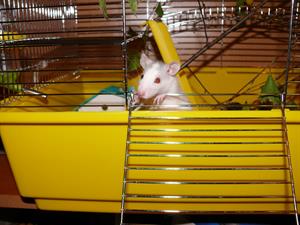
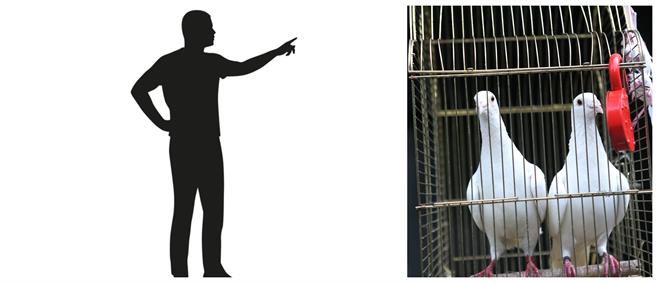

When the storekeeper realised the customer required "Something in a Cage", he became confused and inquired if he meant any pets. Later, the stranger said, in an angry tone, “I mean what I said,” implying that the man only required what he asked and nothing more than that. In addition, the man indicated that he needed something in a cage, which looked small.
When the storekeeper heard that, Mr Purcell hurriedly answered, “I see.” He didn't understand what the man was trying to say, and he didn't like the behaviour of the strange man. As a result, Mr Purcell narrowed his eyes gravely and pursued his lips, thinking what the man required. Then Mr Purcell thought for a while and said that he had some lovely white rats. When the strange man heard that, he promptly replied, “No.” Also, he stated that he did not want any rats; what he wanted was something with wings that could fly. Mr Purcell later realised what the man was trying to say. At once, the storekeeper exclaimed, “A bird!”

A white rat in a cage
When Mr Purcell exclaimed, “A bird!” the man said, “A bird’s all right.” Later the man suddenly pointed to a hanging cage, and it contained two snowy birds. The term “snowy birds” refers to the birds’ appearance, which is similar to that of snow or white. Then he looked at the doves and inquired the storekeeper about the price for those pair of doves.

A man pointed towards a suspended cage
After listening to the customer’s question, he instantly said, “five-fifty.” The storekeeper later mentioned that he had given a reasonable price for the fine pair of doves. After hearing the cost of a couple of doves, the man was unhappy and disappointed. He hesitantly produced a five dollar bill. Finally, the man expressed his desire to own these birds. On the other hand, he said that he only had five dollars with him.
Later, Mr Purcell did a quick mental calculation and discovered that he could still earn a good profit even with a fifty-cent reduction. So he smiled generously, thinking of the quick profit he was going to make.

Mr Purcell thought about the profit he was going to make
After making the quick mental calculation, the storekeeper told the man that he could have them for five dollars if he wanted the pair of doves. The reason behind the statement was that the storekeeper would most likely make a substantial profit despite the fifty-cent reduction. As a result, he informed the man that he would sell them for the price he requested. Then, the man agreed to purchase the fine pair of doves for five dollars.
Later the storekeeper stood on tiptoe to unhook the suspended cage. He stood on tiptoe because he was a short man who couldn’t easily take the hanging cage. The storekeeper then handed the cage to the man. Meanwhile, the man turned his head slightly, listening to the constant chattering and scurrying of the pet from the shop. At last, the man asked the shopkeeper, “That noise”, “Doesn’t it get you?” The statement implies that the man was asking about the noise coming from the shop.
After listening to the man’s question, the storekeeper asked him surprisingly about what noise he was talking about. He didn’t hear anything out of the ordinary. The reason for his statement was that he would sit in the shop every day and do his work, but he never noticed the noises emanating from his pet shop. He was blissfully unaware of it. He was just delighted because his customers would come and joyfully adore the creatures, which they would then buy at a fair price. All he cared about was making a good profit. As a result, he ignored the screeching of the animals.
After hearing the answer from the storekeeper, the man stared fiercely. The man asked, “I mean all this caged stuff. Drives you crazy, doesn’t it?” It implies that the man asked Mr Purcell whether the animals in the cage and their movements did not make him crazy, nor did they irritate him. The man said it because while he entered the shop, the activities or screeching of the caged stuff made him crazy. So he asked Mr Purcell whether the noise didn’t drive him crazy.
Later, the man’s conversation led Mr Purcell to think that the customer was insane or drunk. The basis for his assertion was that he had been running the shop for a long time, but he had not experienced any unusual things from it, and the man had behaved much differently from the first instant. As a result, he thought the man was a drunkard or mad. But on the other hand, he could not tell anything bad to his customer, so he immediately said, “Yes, yes. Certainly, I guess so.”
Later the storekeeper stood on tiptoe to unhook the suspended cage. He stood on tiptoe because he was a short man who couldn’t easily take the hanging cage. The storekeeper then handed the cage to the man. Meanwhile, the man turned his head slightly, listening to the constant chattering and scurrying of the pet from the shop. At last, the man asked the shopkeeper, “That noise”, “Doesn’t it get you?” The statement implies that the man was asking about the noise coming from the shop.
After listening to the man’s question, the storekeeper asked him surprisingly about what noise he was talking about. He didn’t hear anything out of the ordinary. The reason for his statement was that he would sit in the shop every day and do his work, but he never noticed the noises emanating from his pet shop. He was blissfully unaware of it. He was just delighted because his customers would come and joyfully adore the creatures, which they would then buy at a fair price. All he cared about was making a good profit. As a result, he ignored the screeching of the animals.
After hearing the answer from the storekeeper, the man stared fiercely. The man asked, “I mean all this caged stuff. Drives you crazy, doesn’t it?” It implies that the man asked Mr Purcell whether the animals in the cage and their movements did not make him crazy, nor did they irritate him. The man said it because while he entered the shop, the activities or screeching of the caged stuff made him crazy. So he asked Mr Purcell whether the noise didn’t drive him crazy.
Later, the man’s conversation led Mr Purcell to think that the customer was insane or drunk. The basis for his assertion was that he had been running the shop for a long time, but he had not experienced any unusual things from it, and the man had behaved much differently from the first instant. As a result, he thought the man was a drunkard or mad. But on the other hand, he could not tell anything bad to his customer, so he immediately said, “Yes, yes. Certainly, I guess so.”
After hearing the storekeeper’s response, the man’s staring eyes moved closer to him and said, “Listen.” The man asked him whether he knew how long it took him to make the five dollars. After hearing this, the storekeeper thought of sending him out from the shop. He was unable to do so because the man was his customer. Furthermore, if he behaved rudely with the customer, it was not good for his profession. So the storekeeper inquired him, “Why—why, how long did it take you?”
Later, in response to Mr Purcell’s question, the man smiled and claimed it took him ten years to earn these five dollars. Furthermore, he stated that he had worked hard for ten years to earn five dollars and only made fifty cents per year. After hearing that the man had worked ten years to earn five dollars, Mr Purcell thought it would be better to humour him. Mr Purcell's usage of the term "humour" in this context implied that he agreed with the strange man's views because he didn't want his customer to become upset or irritated. Later Mr Purcell said, “My, my; ten years. “That’s certainly a long time. Now...” It implies that “Oh my goodness, it took ten years to earn five dollars,” and that was undoubtedly a long time. The reason behind Mr Purcell’s statement was probably he might not have believed the man, or else he would have thought the man had been telling lies or else he would not want his customer to become annoyed.
Later the man laughed after hearing the response from the shopkeeper and said, “They give you five dollars.” Here “They” refers to the policemen. He then claimed that he had spent ten years of confinement in prison. He further stated that the policemen had given him a cheap, ill-fitting cloth when released from prison. According to the statement, the man had been recently freed from ten-year prison confinement, and the cop had given him a new suit and five dollars at the time of release. In addition, he had directly come to the pet shop for purchasing something in a cage with the money he earned from prison. He also added that the policemen had told him not to get caught again. At last, the storekeeper came to know that the man had come from the prison.
Later, in response to Mr Purcell’s question, the man smiled and claimed it took him ten years to earn these five dollars. Furthermore, he stated that he had worked hard for ten years to earn five dollars and only made fifty cents per year. After hearing that the man had worked ten years to earn five dollars, Mr Purcell thought it would be better to humour him. Mr Purcell's usage of the term "humour" in this context implied that he agreed with the strange man's views because he didn't want his customer to become upset or irritated. Later Mr Purcell said, “My, my; ten years. “That’s certainly a long time. Now...” It implies that “Oh my goodness, it took ten years to earn five dollars,” and that was undoubtedly a long time. The reason behind Mr Purcell’s statement was probably he might not have believed the man, or else he would have thought the man had been telling lies or else he would not want his customer to become annoyed.
Later the man laughed after hearing the response from the shopkeeper and said, “They give you five dollars.” Here “They” refers to the policemen. He then claimed that he had spent ten years of confinement in prison. He further stated that the policemen had given him a cheap, ill-fitting cloth when released from prison. According to the statement, the man had been recently freed from ten-year prison confinement, and the cop had given him a new suit and five dollars at the time of release. In addition, he had directly come to the pet shop for purchasing something in a cage with the money he earned from prison. He also added that the policemen had told him not to get caught again. At last, the storekeeper came to know that the man had come from the prison.
After discovering that the man had come from the prison, Mr Purcell wiped the sweat from his eyebrows. Mr Purcell later thought that he had to advise the man for the well being of doves. So he said that he would tell him how to feed and care for the doves.
But the man, on the other hand, refused to listen to Mr Purcell's advice. He said, "Bah!" The term "Bah" meant that an expression of anger or disapproval. It suggested that the man did not like to hear anything from the storekeeper. Later the man moved slowly out from the shop with his caged birds. Mr Purcell, on the other hand, took a deep breath and felt a sense of relaxation. The reason behind the statement was Mr Purcell wished that the man should go out of his shop because he realised that the man had come from the prison and felt things strangely occurring when he stepped inside the shop.
Later, Mr Purcell strolled with his fat body near the window and peered out. When he looked at his strange customer, he noticed that he had stopped walking. The weird man peered at the pair of doves he got from the pet shop while holding the cage shoulder-high. The man then unlocked the cage and reached inside, pulling one of the doves out. He flung it up in the air. He took the second out of the cage and tossed it after the first. 

Birds faded in the sky
On the other hand, the merchant's face furrowed in puzzlement. The merchant had agreed to sell them to him at a reduced price because the customer desired it. But on the other hand, what the man did was liberated the birds from the cage. In addition, Mr Purcell was shocked to see the man's behaviour. Mr Purcell mumbled under his breath, "did he do that?" He had no idea why he had abandoned them. Finally, Mr Purcell was offended by the stranger's behaviour. He was humiliated since he had sold the doves for a low price, yet the man had set them free.
Through the lesson "I Want Something in a Cage", the narrator tends to tell his readers that the man had lost his ten years in prison without freedom. While he saw the caged birds in the shop, he felt himself in place of them. He had only five dollars, so he bought a pair of doves and let them fly happily in the sky. Here the man's freedom has been compared to the bird's freedom. But the storekeeper was unaware that the pets in his shop were screaming and screeching for freedom. He thought of himself as a professional and held the pets freedom inside the gilded cage. Also, the storekeeper was only concerned about the profit he would earn after selling the pets. The strange act of the customer made him feel insulted. It implies that the man had worked hard in prison, and he spent the earned amount for buying birds and letting them free. But on the other hand, the storekeeper only desired to make a profit. Finally, the storekeeper realised his insignificance and felt vaguely insulted.
But the man, on the other hand, refused to listen to Mr Purcell's advice. He said, "Bah!" The term "Bah" meant that an expression of anger or disapproval. It suggested that the man did not like to hear anything from the storekeeper. Later the man moved slowly out from the shop with his caged birds. Mr Purcell, on the other hand, took a deep breath and felt a sense of relaxation. The reason behind the statement was Mr Purcell wished that the man should go out of his shop because he realised that the man had come from the prison and felt things strangely occurring when he stepped inside the shop.
Later, Mr Purcell strolled with his fat body near the window and peered out. When he looked at his strange customer, he noticed that he had stopped walking. The weird man peered at the pair of doves he got from the pet shop while holding the cage shoulder-high. The man then unlocked the cage and reached inside, pulling one of the doves out. He flung it up in the air. He took the second out of the cage and tossed it after the first.

Liberation of dove
The two doves drifted in the breeze like fluffy balls when he released them from their cage. It suggested that the two birds flying through the sky resembled woollen balls. After sometimes the birds eventually faded into the wintry city's gloomy grey. The man remained still for a few moments, gazing up at the two birds in the sky. He threw the cage away when he saw the birds soaring freely in the skies. Later he put his hand inside his pocket, bowed his head, and walked away.

Birds faded in the sky
On the other hand, the merchant's face furrowed in puzzlement. The merchant had agreed to sell them to him at a reduced price because the customer desired it. But on the other hand, what the man did was liberated the birds from the cage. In addition, Mr Purcell was shocked to see the man's behaviour. Mr Purcell mumbled under his breath, "did he do that?" He had no idea why he had abandoned them. Finally, Mr Purcell was offended by the stranger's behaviour. He was humiliated since he had sold the doves for a low price, yet the man had set them free.
Through the lesson "I Want Something in a Cage", the narrator tends to tell his readers that the man had lost his ten years in prison without freedom. While he saw the caged birds in the shop, he felt himself in place of them. He had only five dollars, so he bought a pair of doves and let them fly happily in the sky. Here the man's freedom has been compared to the bird's freedom. But the storekeeper was unaware that the pets in his shop were screaming and screeching for freedom. He thought of himself as a professional and held the pets freedom inside the gilded cage. Also, the storekeeper was only concerned about the profit he would earn after selling the pets. The strange act of the customer made him feel insulted. It implies that the man had worked hard in prison, and he spent the earned amount for buying birds and letting them free. But on the other hand, the storekeeper only desired to make a profit. Finally, the storekeeper realised his insignificance and felt vaguely insulted.
